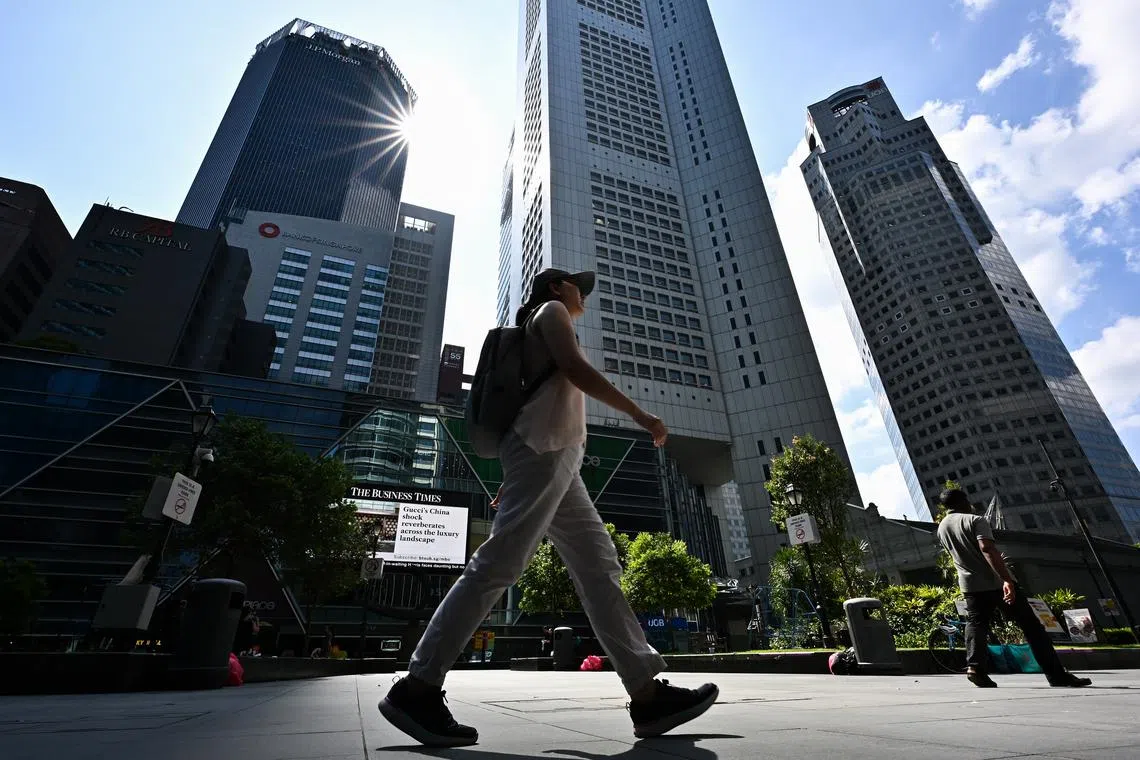Mixed business outcomes seen for S’pore SMEs in 2024: SCCCI survey
Sign up now: Get ST's newsletters delivered to your inbox

Key worries among local SMEs were rising costs, the availability of manpower, and how to be agile.
ST PHOTO: LIM YAOHUI
SINGAPORE – A key annual survey of business conditions found that rising costs and other challenges contributed to a mixed environment for businesses in 2024.
The Singapore Chinese Chamber of Commerce and Industry (SCCCI) found that only a third of local small and medium-sized enterprises (SMEs) expect to post better revenues in 2024 – slightly lower than in 2023 – though 43 per cent of them anticipate better profits, compared with 32.2 per cent in 2023.
Meanwhile, 29 per cent of the respondents forecast lower revenues and about half of them think profits will be worse than in 2023, according to highlights from the SCCCI annual business survey.
Based on the responses, SCCCI president Kho Choon Keng described the business environment for 2024 as mixed, giving the verdict in his welcome address on Oct 9 at the chamber’s SME and Infocomm Commerce Conference Series 2024.
According to the survey, rising costs were the top concern for SMEs, more than three-quarters of which experienced increased costs in 2024. Rising business costs were also the top concern cited in the 2023 survey.
Other main concerns were the challenges linked to the need for business transformation.
While SMEs understood the importance and the imperative for change, they said they lacked expertise and resources, were uncertain about outcomes, and faced resistance from their staff. These were the same top issues raised in the 2023 survey.
Among other worries highlighted by respondents were the availability of suitable manpower, and not knowing how to adapt and pivot their businesses towards areas of growth, Mr Kho said.
This year’s report surveyed 650 respondents between June and August 2024. Of these businesses, 92 per cent were SMEs and 8 per cent were large organisations.
Overall, the Singapore economy, which has been gathering pace in recent months, is likely to see 2024 gross domestic product growth touch the higher end of the official estimate of 2 per cent to 3 per cent. At the same time, growth has become more broad-based – as manufacturing turned positive after months of decline, adding to the strength of the services sector recovery in 2024.
At an individual business level, however, each SME faces headwinds unique to its industry.
Anticipating that the situation in 2024 will be worse all around, the owner and principal consultant of June Gu Consultancy said: “This is largely due to a slide in demand since the pandemic, as well as from increased competition.”
Ms Gu’s firm customises training programmes on business communication, etiquette, and understanding the business environment in China, primarily for government agencies, financial institutions and professional services that do business in China.
“This year wasn’t as good as I expected. It’s actually a bit worse than during the pandemic when people had more time to set aside for training,” she told The Straits Times.
Ms Gu anticipates that 2025 will be better, mainly as she will expand into different areas of training.
In contrast, getArrange.com – a platform that empowers and supports more than 700 financial advisers – expects growing demand for its services is likely to make 2024 a more profitable year for the company.
Co-founder and chief technology officer of the four-man firm Chow Lin Yi cited business costs and manpower as perennial bugbears. “Hiring is usually not easy, especially for our local operations, partly because the talent pool is rather thin.”
Separately, the findings revealed that 44 per cent of SMEs surveyed are stepping up efforts to expand abroad, down from 58.4 per cent in 2023. Another 38 per cent intend to maintain the same level of effort as from a year ago – up from 27.1 per cent in 2023.
The markets that are topmost in the minds of the respondents remained unchanged from the past three surveys as Malaysia, Indonesia and China.
One SME that has expanded further into the region is education provider KinderWorld International Group. KinderWorld’s director of communications and partnerships Benaiah Wee said: “We know that business opportunities could be limited here, that’s why we’ve ventured overseas.”
While Singapore is the company’s headquarters, the bulk of its chain of K-12 international schools are abroad.
The group has 40 staff in Singapore and almost another 1,000 overseas.
On the difficulties that SMEs face, Mr Wee said: “These same challenges exist across the region, not just solely here in Singapore,” he said.
“With increasing business costs and geopolitical tensions, we believe there are still some bright spots, and we want to leverage that whenever we can.”
In his keynote address at the conference, Second Minister for Trade and Industry Tan See Leng said: “It is very encouraging to see... that our SMEs have started to take a progressive and resilient attitude towards today’s challenges.”



